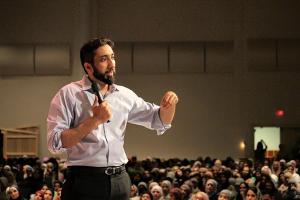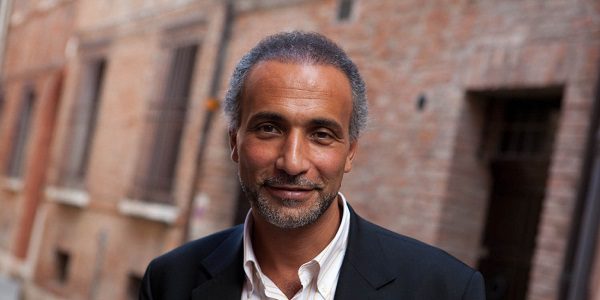The allegations of sexual misconduct against Nouman Ali Khan and sexual assault or rape in the case of Tariq Ramadan have presented numerous challenges to Muslim communities. For a culture that so reveres scholars, arguably to a point of blind commitment, the realization that some may engage in behavior devoid of virtue and harmful to their followers was earth-shattering.
You may still find some, particularly within the social media comment threads of a Nouman Friday khutbah (sermon), who will deny the possibility of wrongdoing, victim-blame, or a commit to any number of deflections. But, if the truth is ever to surface regarding these allegations, and arguably it has in the case of Nouman Ali Khan, a very important question remains:
How do Muslims view the works and scholarship of these scholars in light of personal and/or public scandal?
This question of what to do with their work is profoundly personal, as I consider how Ramadan’s scholarship impacted my growth as a Muslim. I remember sitting anxiously in a crowded conference hall at an ICNA convention nearly five years ago, waiting to hear the enlightened words of Professor Ramadan. I thought of Ramadan as being leagues ahead of all the other scholars in attendance, and I was itching to ask some entirely esoteric question about his wrestling with the works of Foucault or Nietzsche as a person of faith.
So, whereas I was less impacted by the allegations against Nouman Ali Khan, the allegations against Ramadan hit much closer to home.
 Both scholars spoke/wrote extensively on Islamic ethics, which makes the allegations even more troublesome. How are we to take knowledge of ethics and virtues from individuals who may have acted in vile and abusive ways? Is the scholarship produced by Khan and Ramadan inextricably linked to them as individuals? Or, is there a way we can benefit from the knowledge they produced while still acknowledging their alleged wrongdoings?
Both scholars spoke/wrote extensively on Islamic ethics, which makes the allegations even more troublesome. How are we to take knowledge of ethics and virtues from individuals who may have acted in vile and abusive ways? Is the scholarship produced by Khan and Ramadan inextricably linked to them as individuals? Or, is there a way we can benefit from the knowledge they produced while still acknowledging their alleged wrongdoings?
The Christian world has faced this dilemma as well, and we might learn from some of the ways in which Christians managed their own instances of scholarly abuse.
John Howard Yoder was a renown Mennonite theologian and ethicist throughout the 20th century, who wrote seminal works of Christian politics and ethics. Yoder also sexually harassed many of his female Mennonite students under the guise of an “experiment in human sexuality.” As the extent of Yoder’s abuse became evident, Christians struggled to determine how his monumental scholarship should be handled going forward.
Stanley Hauerwas, Professor Emeritus of Divinity and Law at Duke University, was greatly indebted to Yoder’s work and found it difficult to imagine Christian peace ethics without Yoder’s contributions. However, Hauerwas has also said that he could only use Yoder’s work “with an asterisk,” noting that Yoder’s thought should never be considered without mention of Yoder’s behavior.
Others would argue that it is precisely Yoder’s thought that lends itself to a patriarchal world, and thus Yoder’s work should be condemned along with his actions.
In the aftermath of the Nouman Ali Khan allegations, intense debate ensued on social media threads as some followers sought a compromise that would allow them to take a portion of his knowledge as acceptable while disregarding his talk of gender relations. Interestingly enough, Khan’s understanding of gender relations is quite popular, being shared by other well-known scholars like Omar Suleiman.
Whether critic or supporter, few have questioned whether his ideas on gender and sexual ethics may have actually contributed to his behavior, though it should not be overlooked that his insistence on segregation may actually produce a hyper-sexualized environment.
In this way, critiques of Yoder’s thought as patriarchal and revealing of a deeper psychological neglect may very well be analogous to Khan’s lectures about, particularly his disparaging views on the inevitably nefarious nature of men and their desires towards women.

Just as Hauerwas struggled to reconcile the knowledge of Yoder’s actions with the significant influence Yoder played in his own life as a scholar, countless Muslims are wrestling with their feelings towards Khan and Ramadan. Personally, I will continue to reflect upon the ideas of Ramadan, though adopting the “asterisk” approach is the least I can do if he is found guilty of the allegations against him.
Likewise, for those who continue to cite Nouman Ali Khan as inspiration and motivation, it would do good to reflect on how his thought may be linked to his behavior. At the very least, we should remind ourselves of the fragility of placing too much trust in the hands of imperfect human beings.
In that way, we not only keep faith in the value of a virtuous life inspired by the Prophet Muhammad (saw), but we also hold to high standards those who seek to claim the mantle of expertise in his ways.
Charles M. Turner’s Altmuslim column appears in the third week of every month. Turner is a PhD student in Political Science at the University of Utah, and his research focuses on minority politics, particularly the inclusion of religious minorities in American democracies. Prior to continuing his studies, he served as the Muslim Life Coordinator at the University of Richmond, Government Teacher for the Madina School of Richmond, and a member of the Civic Outreach Committee at the Islamic Center of Virginia.













